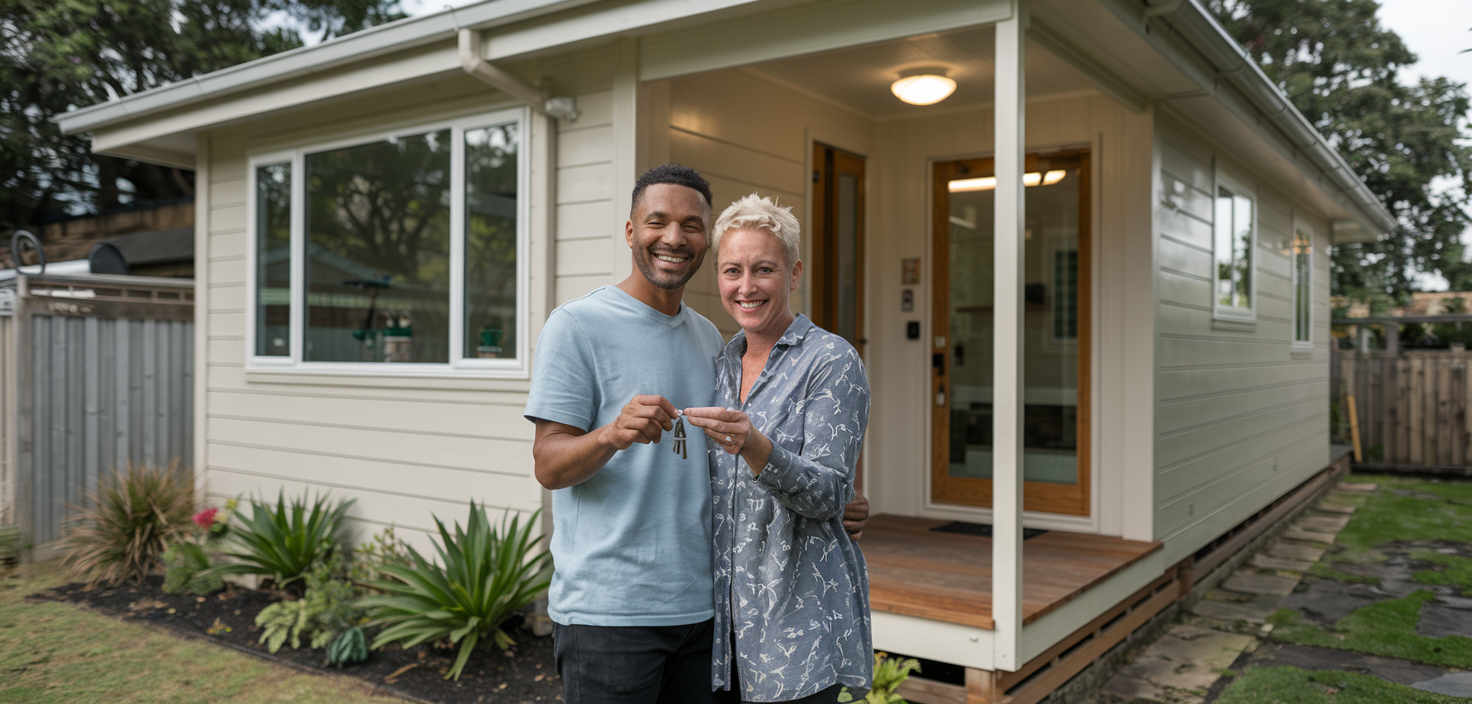Property Conveyancing in New Zealand: The Definitive A-to-Z Process
A Definitive Guide to Property Conveyancing in New Zealand
Key Takeaways
- The New Zealand property market is showing renewed activity, with a significant increase in the number of properties sold, making it a crucial time for buyers and sellers to be prepared.
- Property conveyancing is the essential legal process of transferring a property's ownership from a seller to a buyer, involving steps like due diligence, signing agreements, and final settlement.
- The conveyancing process typically follows a timeline that includes signing a Sale and Purchase Agreement, fulfilling conditions, going unconditional, and completing the transaction on settlement day.
- Modern online conveyancing services provide a convenient, transparent, and efficient alternative to traditional in-person legal meetings, streamlining the entire process.
The New Zealand property market is buzzing with a sense of cautious optimism. While headlines might focus on slight shifts in median prices, the real story is in the activity on the ground. More Kiwis are buying and selling homes, signalling a return of confidence. With the real estate market in New Zealand projected to grow at an annual rate of 4.30% and reach a staggering market volume of US$1.10tn by 2029 , it’s clear that property remains a cornerstone of our nation's wealth. This projected growth, known as a Compound Annual Growth Rate (CAGR), indicates a steady and significant increase in the market's total value over the next few years.
But what does this mean for you? Whether you're a first-home buyer, a seasoned investor, or looking to sell the family home, one thing is certain: you'll need to navigate the conveyancing process. This legal journey, which transfers property ownership from one person to another, can often feel like a maze of jargon and paperwork. Our goal is to demystify it for you. This guide will break down everything you need to know, empowering you to make your next property move with clarity and confidence.
What's Happening in the New Zealand Property Market?
After a period of adjustment, the market is finding its feet again. Recent data shows a clear upward trend in activity. In fact, the number of properties sold in New Zealand rose by 8.9% in May 2025 compared to the previous year. This jump from 6,579 to 7,166 sales shows that buyers and sellers are re-engaging with the market. It’s not just residential properties, either. Investor confidence is also on the rise, with a growing interest in commercial assets. For example, retail property is now favoured by 9% of investors , more than double the figure from 2023. This renewed energy across the board makes understanding the transaction process more important than ever.

What Exactly is Property Conveyancing?
At its heart, property conveyancing is the legal process required to transfer ownership of real estate from the seller to the buyer. It’s the formal, behind-the-scenes work that ensures the sale is legally binding and that the property title is correctly updated. A conveyancing professional - usually a property lawyer - acts as your guide and representative, handling all the legal documentation and communication to ensure a smooth and secure transaction.
Traditionally, this meant multiple trips to a lawyer's office to sign stacks of paper. But things have changed. We believe the process should be as stress-free as the feeling of getting your new house keys. That's why our approach at ConveyOnline is designed for modern life. Our entire service is entirely virtual, eliminating the need for in-person meetings with lawyers. You can manage the whole process from the comfort of your home, saving you precious time and energy.

The Conveyancing Process: A Step-by-Step Guide
While every transaction is unique, the conveyancing journey generally follows a set path. Understanding these milestones can help you feel in control from start to finish.
1) The Sale and Purchase Agreement
This is the foundational document of any property transaction. The Sale and Purchase Agreement (S&P) is a legally binding contract that outlines all the terms and conditions of the sale, including the price, settlement date, and any special conditions. It's critical to have your property lawyer review this agreement before you sign it to ensure your interests are protected.
2) Due Diligence and Fulfilling Conditions
Once the agreement is signed, the "conditional" period begins. This is the buyer's opportunity to do their homework, a process known as due diligence. Common conditions include:
- Finance: Securing final approval for a home loan.
- LIM Report: Obtaining a Land Information Memorandum from the local council to check for any issues with the property.
- Building Inspection: Getting a professional builder's report to identify any structural problems.
- Insurance: Confirming that the property is insurable.
- Solicitor’s approval: this let’s you pull out of the contract if your lawyer finds anything untoward in it.
Your conveyancer will help you navigate these conditions and ensure they are satisfied by the due dates outlined in the S&P agreement.
3) Going Unconditional
Once all conditions have been met and you've given your lawyer the green light, the agreement becomes "unconditional." This is a major milestone. At this point, both the buyer and seller are legally committed to completing the sale, and the buyer will typically pay the deposit to a trust account.
4) Pre-Settlement
In the lead-up to settlement day, your conveyancer is busy preparing all the necessary legal documents. This includes preparing mortgage documents for the bank and the Authority and Instruction (A&I) forms, which give your lawyer the authority to act on your behalf to transfer the property title and funds. You'll also conduct a pre-settlement inspection of the property to ensure it's in the same condition as when you signed the agreement.
5) Settlement Day
This is the day it all comes together. Your lawyer will work with the seller's lawyer and the banks to transfer the purchase funds. Once the seller's lawyer confirms the money has been received, they will authorise the release of the keys. Your lawyer will then register the change of ownership with Land Information New Zealand (LINZ), and the property is officially yours. For those buying a home, our dedicated team guides you through each of these stages, ensuring a seamless experience that fast-tracks the home ownership process so you can focus on the excitement of moving in.
How Much Does Conveyancing Cost in NZ?
The cost of conveyancing can vary depending on the complexity of the transaction. However, we believe in making things simple and transparent, which is why we offer fixed, all-inclusive pricing. You know exactly what you're paying from the outset, with no hidden surprises. Our fees are:
- Buying a Property: From $1,799 (includes GST & disbursements)
- Selling a Property: From $1,499 (includes GST & disbursements)
- Refinancing a Mortgage: From $1,249 (includes GST & disbursements)
To make it even easier, our fees are taken from the final settlement sum , meaning you don’t need to worry about upfront payments or credit card bills. It’s all handled as part of the transaction, simplifying your budget and cash flow.
Navigate Your Next Property Move with Confidence
The New Zealand property market offers exciting opportunities, but success often lies in the details. The conveyancing process, while technical, is a manageable and straightforward journey with the right support. By understanding the key steps and partnering with a team that values clarity and convenience, you can navigate your transaction without the stress and confusion.
Whether you are buying, selling, or refinancing, our mission is to provide a reliable, affordable, and accessible service that puts you in control. Let us handle the legal heavy lifting so you can focus on what truly matters—your next chapter.
_Disclaimer: The information provided in this article is for general informational purposes only and does not constitute legal, financial, or professional advice. You should not rely on the information in this article as an alternative to legal advice from your lawyer or other professional services provider. If you have any specific questions about any legal matter, you should consult your lawyer or other professional services provider._










